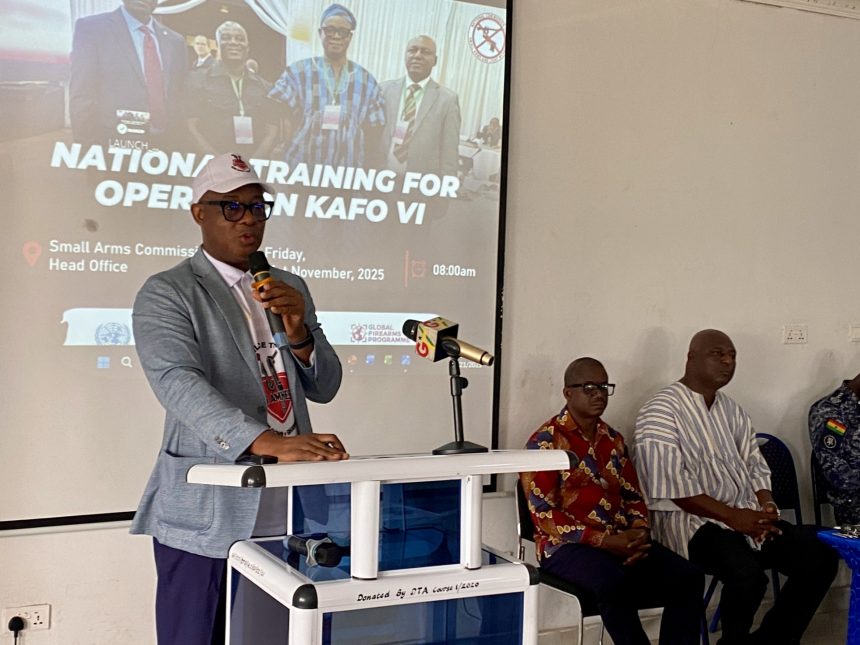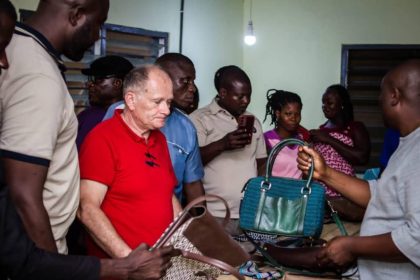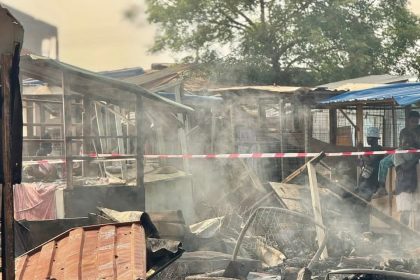Ghana has intensified efforts to curb the proliferation of illicit firearms and reduce gun-related crime through the KAFO VI operations, a coordinated initiative involving multiple security agencies.
Dr Adam Bonaa, the Executive Secretary, National Commission on Small Arms and Light Weapons (NACSA), said the operations would target Ghana’s entry and exit points to strengthen prevention, combating, and eradicating the trafficking of arms, ammunition, explosives, drugs, and other contraband.
The initiative also seeks to reduce gun-related violence and improve public safety.
“About nine out of 10 violent crimes in Ghana involve illicit firearms. KAFO VI is critical to retrieving these weapons and ensuring the safety of our communities,” he said on Friday in Accra.
The exercise is being undertaken by the NACSA, in collaboration with the Customs Division of the Ghana Revenue Authority (GRA), Interpol (Ghana Police Service), and the Office of the Attorney General.
The KAFO VI operations form part of a broader strategy to strengthen the capacity of security agencies and other stakeholders through targeted training in arms detection, surveillance, intelligence sharing, and operational collaboration.
That would ultimately improve agency coordination, disrupt illicit arms and contraband networks, reduce gun-related crime, and enhance national and regional security, Dr Bonaa said.
Participants were drawn from NACSA, Customs, Interpol, the Ghana Armed Forces, Ghana Immigration Service, Narcotics Control Commission, Economic and Organised Crime Office (EOCO), Ghana Ports and Harbours Authority.
The others are Ghana Civil Aviation Authority, Fisheries Commission, the National Intelligence Bureau, National Security Council, Office of the Attorney General, and the Judicial Service.
Dr Bonaa said the training, known as the Trainer of Trainers (TOT), was necessitated by a UN-sponsored programme for six West African countries, facilitated by the United Nations Office on Drugs and Crime (UNODC).
He said in May and June this year, he led a team of four officers to Bamako in Mali, to participate in the Master Training, where trainers from across the globe were brought in to train representatives from Ghana, Togo, Benin, Niger, Mali, and Burkina Faso.
“We were the only Anglophone country among the Francophone nations,” he noted.
Dr Bonaa said the training would enable officers to conduct spontaneous operations while KAFO VI was ongoing in Ghana and the other participating West African countries.
“The idea is to ensure that we are able to crack down on illicit and proliferated firearms that are in the hands of people,” he said.
“Once trained, officers will be deployed in the field to conduct operations, including rummaging suspected containers, vehicles, cargoes, and concealed spaces.”
“K-9 units from the police, military, and customs would also be deployed to detect hidden weapons and ammunition.”
He added that the trained officers would in turn, become facilitators to train their colleagues nationwide.
“This is the first training since our return from Mali. Once completed, these officers will go on to share their knowledge with others who were not part of the TOT in Ghana,” he said.
He reiterated the Government’s declaration of a six-week amnesty from December 01, 2025 to January 15, 2026, allowing civilians to surrender illegal weapons without fear of arrest or prosecution.
“During this period, only security agencies are permitted to handle firearms. Anyone found firing a weapon for celebration or festival will be arrested,” he warned.
The operations also include intelligence-led follow-up measures to recover weapons not voluntarily surrendered.
“Informants reporting offenders will be rewarded, and offenders will face prosecution once the amnesty period ends.”
Dr Bonaa highlighted the importance of inter-agency collaboration, saying: “The Small Arms and Light Weapons Commission collaborates with all security agencies to ensure smooth operations. Customs, immigration, the police, and military officers work together to guarantee effective retrieval of illicit firearms.”
Dr Bonaa urged the public and traditional authorities to cooperate with the initiative, emphasising that collective efforts were critical to ensuring Ghana’s borders remain safe and secure.






